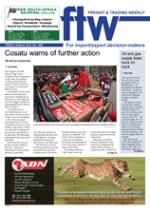The proposed R100-billion
dig-out port on the old
Prospecton airport site at
Durban should be a blend
of the public and private
sectors in both investment
and management, according
to Professor Trevor Jones,
former head of the School
of Economics at University
of KwaZulu-Natal, and
now busy establishing a
maritime law faculty at the
varsity.
The future challenges
for the new port, he told
FTW, are: Who will pay for
the new capacity, and who
will manage it – and how
effectively?
He described the idea of
a combined municipal and
Transnet relationship on
ownership as “fanciful”, but
stressed a more powerful
partnership with private
investors as being a
desirable way to go.
On the management side,
Jones was rather sceptical
about Transnet ever wanting
to let go of its current
dominance in terminal
operations, but agreed with
FTW that private sector
management of terminals
was one possible means of
achieving more efficiency.
On the future operation
of the dig-out port, he
suggested that much
stronger Transnet/city/port
users’ relationships were the
way to “unlock port value”.
Jones added his name to
a long list of FTW contacts
who, over the years, have
proposed two desires:
private sector involvement,
and competition in the
ports’ operations.
On the government side,
the first mention in recent
years of private business
playing a role in port
management was when Alec
Erwin, then minister of
trade and industry, hinted
that this might become
part of ANC policy. But he
proposed this purely on a
“public/private partnership”
basis. This idea, though,
faded into the background
as time went by, largely
because of opposition from
union body, Cosatu – which
suggested that this could
lead to job cuts.
However, the concept has
been resurrected in recent
times, but more hinted at
than firmly proposed.
In his Budget address, for
example, finance minister
Pravin Gordhan said that
“no good project” would
be short of funding and
indicated that there was a
role for the private sector
to play in the delivery of
infrastructure.
But he did add
management to investment,
when he said: “Private
sector capacity can also
be mobilised through
construction and operating
concessions – for example
in the management of
industrial development
zones, freight logistics and
ports operations.”
In a more direct proposal,
Transnet Port Terminals
(TPT) CEO, Karl Socikwa,
suggested that TPT was
planning to bid, possibly
with partners, for the right
to operate any possible new
terminal capacity that could
arise should SA proceed
with the development of the
dig-out port.
He added that its volume
projections indicated
that additional container
terminal capacity could
be required by as early
as 2019, notwithstanding
current initiatives to bolster
the capacity of the Durban
Container Terminal (DCT)
– and this fits with the
2017/18 deadline date for
the opening of the dig-out
port.
He said that TPT would
“fight” for the opportunity
to participate in what
could become a future key
“gateway” harbour.
Jones agreed, describing
the dig-out port site as
the front runner in future
capacity/demand balance at
the port city of Durban. It’s
the “right choice” he said,
and has a “less saturated
immediate port area and
good intermodal links”.
He saw it as
offering “real capacity
enhancement” and adopting
the role of a “hub port”.
‘Dig-out port must be public/private venture’
16 Mar 2012 - by Alan Peat
0 Comments
FTW - 16 Mar 12

16 Mar 2012
16 Mar 2012
16 Mar 2012
16 Mar 2012
16 Mar 2012
16 Mar 2012
16 Mar 2012
16 Mar 2012
16 Mar 2012
16 Mar 2012
16 Mar 2012
Border Beat
Featured Jobs
New
New
